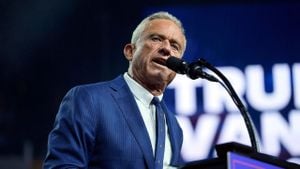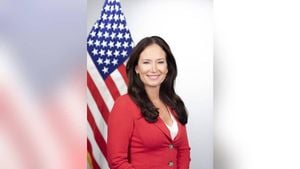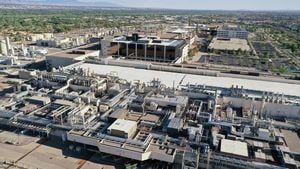The COP29 climate talks concluded with intense negotiations resulting in wealthy countries pledging $300 billion annually to assist poorer nations grappling with the effects of climate change. Despite this promise, developing countries expressed frustration and disappointment, citing the commitment as woefully inadequate compared to their needs.
After two grueling weeks filled with late-night discussions, representatives from nearly 200 nations reached this agreement early Sunday morning under the massive Baku Stadium, Azerbaijan's climate conference site. The deal, which establishes the new funding goal by 2035, is intended to replace the expiring $100 billion commitment from developed countries.
Delegates were pushed to their limits, negotiating through chaotic and often tense circumstances. There were significant moments of discord, including walkouts from representatives of small island nations and least-developed countries, who felt their voices were not being heard amid the turmoil of negotiation.
At the heart of the negotiations was the stark divide between developed and developing nations. Rich countries have long been the largest contributors to greenhouse gas emissions and were under pressure to provide substantial financial aid to those less responsible for climate change yet more vulnerable to its impacts. While the initial proposed contribution was $250 billion, it fell well short of the $1 trillion requested by developing nations to adequately address their climate-related challenges.
The final agreement aims to empower developing countries to transition to cleaner economies and adapt to extreme weather, posing many questions about the effectiveness of such funding. Leaders from vulnerable nations were quick to point out the inadequacies of this financial aid. India's representative described the deal as "a paltry sum," emphasizing its inability to reflect the enormity of the climate crisis at hand.
UN Secretary-General António Guterres echoed these sentiments, stating he had hoped for more ambitious outcomes on financing and mitigation efforts. He insisted on the urgency of timely and effective commitment fulfillment: "Commitments must quickly become cash," he urged.
During discussions, developing nations highlighted the necessity for more reliable funding sources to aid their efforts against climate change. Many representatives pointed out the difficulty of coping with catastrophic weather conditions and rising sea levels with insufficient financial backing.
Simon Stiell, UN Climate Change Executive Secretary, called the new financial pledge "an insurance policy for humanity," arguing it would help fuel the global transition to clean energy. Despite this, the consensus was clear: developing nations feel largely let down by the agreement. Sierra Leone’s representative articulated the disappointment felt within Africa, labeling the funding level "a lack of goodwill" from developed nations.
The agreement didn’t just stop at funding; delegates also discussed the establishment of rules for trading carbon credits, aimed at incentivizing emission reductions. This marks progress on the global carbon market, which was seen as key to motivating countries to invest in sustainable projects.
Despite the apparent achievements, many delegates expressed concern about maintaining momentum and commitments heading to the next COP meeting, set to take place next year. Questions lingered about nations adhering to their financial commitments, especially with shifting political climates, including Donald Trump’s recent election, which may threaten U.S. participation and funding.
On the floor of the conference hall, emotions ran high. Feeling sidelined, representatives from small island states reiterated their struggle against rising waters. "After this COP29 ends, we cannot just sail off; we are literally sinking," stated the delegation head from Samoa, spotlighting the precarious realities many of their nations face.
Developed nations, particularly from the EU and the U.S., maintained they could only do so much financially without substantial contributions from faster-growing economies like China. Although the collective goal for the aimed level of funding stands at $1.3 trillion annually by 2035, much of it is expected to come from the private sector rather than direct governmental aid.
Faced with the backdrop of recent record temperatures and extreme weather, many viewed the negotiations as pivotal. Mukhtar Babayev, COP29 president and veteran of Azerbaijan’s oil industry, touted the agreement's success against skepticism. Though applause came from some quarters, the critiques from developing nations suggest considerable skepticism about the pledged amounts becoming tangible support.
The urgency for climate action remains ever-present, with activists and vulnerable countries urging developed nations to follow through with the pledged funding. The divided atmosphere and accusations of insufficient engagement by industrialized powers could complicate future negotiations. Indeed, many suggest the path forward requires significant collaboration and innovative cooperation across socio-economic boundaries.
The discontent surrounding the final agreements has set the stage for stirring discussions leading up to future COP conferences. The road to sustainable global climate policy is fraught with challenges, but the experiences and lessons from COP29 demonstrate the importance of unwavering commitment and proactive dialogue.
While optimism exists within the frameworks of COP summits, tangible outcomes hinge on the ability of nations to respect commitments, address concerns, and engage effectively. With the specter of looming climatic catastrophes, the coming years will significantly test the resilience and collaboration of nations across the globe.
Given the stakes at hand, all eyes will remain on the commitments made at COP29 and the collective resolve to confront the climate crisis head-on.



